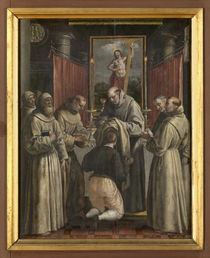The Catholic Defender: Saint Lawrence
- Donald Hartley

- Aug 9
- 3 min read
Updated: Aug 11
Deepertruth with special permission and aid with Franiciscan Media, a great team for the Lord

The esteem in which the Church holds Lawrence is seen in the fact that today’s celebration ranks as a feast. We know very little about his life. He is one of those whose martyrdom made a deep and lasting impression on the early Church. Celebration of his feast day spread rapidly.
He was a Roman deacon under Pope Saint Sixtus II. Four days after this pope was put to death, Lawrence and four clerics suffered martyrdom, probably during the persecution of the Emperor Valerian.
Legendary details of Lawrence’s death were known to Damasus, Prudentius, Ambrose, and Augustine. The church built over his tomb became one of the seven principal churches in Rome and a favorite place for Roman pilgrimages.
A well-known legend has persisted from earliest times. As deacon in Rome, Lawrence was charged with the responsibility for the material goods of the Church, and the distribution of alms to the poor. When Lawrence knew he would be arrested like the pope, he sought out the poor, widows, and orphans of Rome and gave them all the money he had on hand, selling even the sacred vessels of the altar to increase the sum.
When the prefect of Rome heard of this, he imagined that the Christians must have considerable treasure. He sent for Lawrence and said, “You Christians say we are cruel to you, but that is not what I have in mind. I am told that your priests offer in gold, that the sacred blood is received in silver cups, that you have golden candlesticks at your evening services. Now, your doctrine says you must render to Caesar what is his. Bring these treasures—the emperor needs them to maintain his forces. God does not cause money to be counted: He brought none of it into the world with him—only words. Give me the money, therefore, and be rich in words.”
Lawrence replied that the Church was indeed rich. “I will show you a valuable part. But give me time to set everything in order and make an inventory.” After three days he gathered a great number of blind, lame, maimed, leprous, orphaned, and widowed persons and put them in rows. When the prefect arrived, Lawrence simply said, “These are the treasure of the Church.”
The prefect was so angry he told Lawrence that he would indeed have his wish to die—but it would be by inches. He had a great gridiron prepared with coals beneath it, and had Lawrence’s body placed on it. After the martyr had suffered the pain for a long time, the legend concludes, he made his famous cheerful remark, “It is well done. Turn me over!”

In fact, God gave him so much strength and joy that he even joked. "Turn me over," he said to the judge. "I'm done on this side!" Just before he died, Lawrence said, "It's cooked enough now." Then he prayed that the city of Rome might be converted to Jesus and that the Catholic Faith might spread all over the world.
He is the patron saint of the poor and of cooks. Lawrence was among the seven deacons of the Roman church serving Pope Sixtus II, whose martyrdom preceded Lawrence's by a few days: they were executed during the persecution under the Roman emperor Valerian.
Having died a martyr for Christ, St. Lawrence is the patron of deacons, chefs and firefighters. Around the time of his feast day, which is celebrated on August 10, the night sky is lit with bright lights.
You can ask for his prayers if you are struggling with poverty, or you can ask him to pray for a poor person whom you know. Additionally, St. Lawrence is the patron saint of Rome. You can ask him to pray for you if you live in Rome or are preparing to travel to Rome.
Lawrence, who in the flower of youth suffered and died for the faith, hear our prayers. With confidence we fly to your patronage. Obtain for us deep faith, strong hope, a sincere love of God and neighbour, unsullied chastity and humble obedience. Inspire us to succour the poor, the needy, the sick and the afflicted.





















Comments